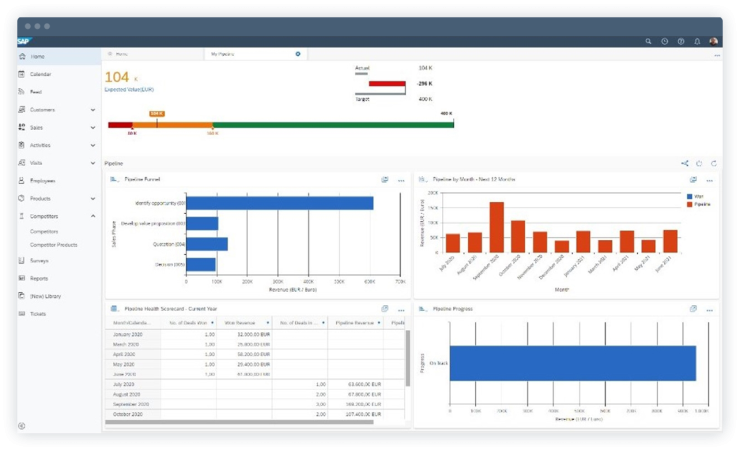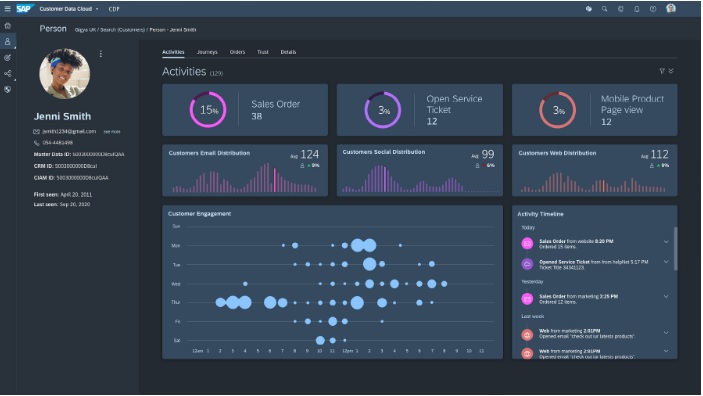SAP Sales Cloud es una solución de gestión de relaciones con el cliente (CRM) nativa en la nube diseñada para automatizar y optimizar los procesos de venta. Impulsada por inteligencia artificial, ofrece a los equipos comerciales recomendaciones inteligentes, ventas guiadas y proyecciones en tiempo real que ayudan a priorizar oportunidades y acelerar el ciclo de ventas. Su interfaz unificada permite a los usuarios acceder a una vista 360° del cliente, incluyendo historial de transacciones, interacciones y datos de comportamiento, tanto desde el escritorio como desde dispositivos móviles.

Entre sus funcionalidades clave destacan la automatización inteligente de la fuerza de ventas, con flujos de trabajo configurables que reducen tareas manuales; capacidades de venta digital omnicanal que facilitan interacciones virtuales y personalizadas; y analíticas accionables con dashboards y reports personalizables para monitorear el rendimiento del pipeline, detectar fugas y ajustar estrategias sobre la marcha. Además, incorpora herramientas de planificación dinámica de visitas, ejecución en punto de venta y retail execution, optimizando rutas, auditorías in situ y seguimiento de KPI específicos por ubicación.
SAP Sales Cloud se integra de forma nativa con el ecosistema SAP (S/4HANA, Commerce Cloud, Service Cloud) y con aplicaciones de terceros para mantener la coherencia de datos en toda la organización. Su arquitectura escalable soporta entornos multinube y multiregión, permitiendo la sincronización de datos maestros, productos, precios y contratos. Además, ofrece entornos sandbox para pruebas, gestión avanzada de roles y accesos, y opciones de personalización para adaptar procesos a políticas de aprobación y flujos de venta internos
Funcionalidades de SAP Sales Cloud
SAP Sales Cloud ofrece un conjunto amplio y sofisticado de funcionalidades diseñadas para cubrir todo el ciclo de ventas, desde la generación de leads hasta el cierre de oportunidades y la gestión postventa. Estas funcionalidades están pensadas para mejorar la productividad de los equipos comerciales, aumentar la visibilidad de las oportunidades de negocio y asegurar una experiencia fluida para el cliente. A continuación se detallan las principales capacidades del sistema:
Gestión de cuentas y contactos
Permite almacenar, organizar y acceder fácilmente a información detallada de clientes, prospectos y socios comerciales. La base de datos centralizada incluye datos maestros, historial de interacciones, contratos, documentos adjuntos y relaciones jerárquicas entre cuentas. Gracias a la integración con otras soluciones SAP, los usuarios pueden consultar en tiempo real información financiera, de pedidos, entregas o reclamaciones asociadas a cada cliente.
Gestión del pipeline de ventas y oportunidades
SAP Sales Cloud proporciona herramientas potentes para gestionar y hacer seguimiento a oportunidades comerciales. Los representantes de ventas pueden crear oportunidades, registrar actividades asociadas (llamadas, reuniones, correos), definir etapas de venta personalizadas y asociar productos o servicios. El sistema permite calcular automáticamente la probabilidad de cierre y el valor estimado de cada oportunidad. Gracias al motor de analítica embebido, se pueden generar previsiones de ventas más precisas y detectar posibles cuellos de botella.
Automatización de tareas comerciales
La solución ayuda a reducir la carga administrativa mediante la automatización de procesos repetitivos, como la creación de ofertas, la programación de seguimientos o el envío de correos electrónicos. Los flujos de trabajo se pueden configurar para alertar a los usuarios sobre acciones pendientes, aprobaciones necesarias o cambios relevantes en una oportunidad. Esta automatización mejora la eficiencia del equipo de ventas y asegura que se sigan los procesos definidos por la organización.
Configuración, precio y cotización (CPQ)
SAP Sales Cloud incluye capacidades de CPQ integradas que permiten a los comerciales configurar productos o servicios complejos, calcular precios automáticamente y generar presupuestos personalizados. Estas funciones son especialmente valiosas en sectores con estructuras de precios variables, múltiples combinaciones de producto o requisitos específicos de cliente. La funcionalidad CPQ se puede ampliar aún más mediante integración con SAP Configure, Price, Quote (SAP CPQ).
Movilidad y trabajo offline
La aplicación móvil de SAP Sales Cloud, disponible para iOS y Android, permite a los usuarios trabajar desde cualquier lugar, incluso sin conexión a internet. Los representantes pueden acceder a su cartera de clientes, registrar interacciones, actualizar oportunidades y consultar KPIs en tiempo real. La sincronización automática asegura que la información se actualice en cuanto se recupere la conectividad. Esta capacidad resulta esencial para equipos de ventas de campo o distribuidos geográficamente.
Inteligencia comercial y analítica integrada
La solución incorpora funcionalidades de analítica avanzada e inteligencia artificial para apoyar la toma de decisiones. Entre ellas se incluyen predicciones de cierre de oportunidades, análisis de riesgo, recomendaciones de productos cruzados (cross-selling) y alertas sobre oportunidades críticas. Los dashboards interactivos permiten visualizar indicadores clave de rendimiento (KPIs), evolución del pipeline y comparación entre representantes o territorios.
Gestión de actividades y calendarios
Los usuarios pueden planificar y registrar todas las actividades de ventas, ya sean visitas a clientes, llamadas, emails o reuniones. La integración con herramientas de productividad como Microsoft Outlook o Google Calendar permite sincronizar automáticamente eventos y tareas. Esta visibilidad centralizada mejora la planificación del trabajo y facilita la colaboración entre miembros del equipo.
Gestión de territorios y cuotas
SAP Sales Cloud permite asignar territorios y cuotas de ventas a representantes o equipos comerciales. Se pueden definir reglas de asignación automática de cuentas, territorios por región, sector o volumen, y realizar análisis comparativos entre objetivos y resultados. Esta funcionalidad es fundamental para organizaciones con estructuras de ventas complejas y segmentadas.
Integración omnicanal y colaboración
La plataforma se integra con otros canales y soluciones del ecosistema SAP (como SAP Service Cloud, SAP Marketing Cloud y SAP Commerce Cloud), lo que permite una experiencia omnicanal coherente. También admite herramientas de colaboración como Microsoft Teams, facilitando la comunicación en tiempo real entre equipos de ventas, preventa, soporte y administración.
Extensibilidad y personalización
SAP Sales Cloud es altamente configurable. Permite personalizar formularios, vistas, reglas de negocio, flujos de trabajo y campos específicos sin necesidad de programación. Además, mediante SAP Business Technology Platform (BTP), se pueden desarrollar extensiones, integrar sistemas externos y aplicar lógica personalizada utilizando APIs y servicios cloud-native.
Análisis técnico de SAP Sales Cloud
Se trata de una solución integral de CRM diseñada para optimizar todo el ciclo de ventas, desde la captación de leads hasta el cierre y la renovación de contratos. Basada en una arquitectura en nube y potenciada por inteligencia artificial, centraliza datos de clientes, interacciones y productos en un único repositorio. Su diseño modular facilita la adaptación de procesos a políticas corporativas y el escalado según crecen las necesidades del negocio.
La interfaz unificada agrupa módulos de gestión de prospectos, oportunidades y cuentas en un único espacio de trabajo. Los paneles configurables ofrecen widgets de datos e informes programables que permiten alinear indicadores clave con objetivos comerciales específicos.
El motor de automatización impulsa flujos de trabajo personalizables para la asignación de leads, envíos automáticos de notificaciones y secuencias de aprobación. Las reglas de negocio definidas por el usuario reducen errores operativos y aseguran una respuesta ágil ante cambios en el estado de cada oportunidad.
En el ámbito de CPQ (Configure-Price-Quote), incorpora un catálogo de productos con validaciones de compatibilidad y descuentos escalonados. La generación de cotizaciones y contratos, con firma electrónica integrada, minimiza los tiempos de entrega y mantiene un histórico exhaustivo de revisiones.
Los módulos de analíticas y reporting habilitan el análisis en tiempo real de volumen de ventas, tasas de conversión y ciclos medios. Los gráficos interactivos y alertas configurables detectan anomalías, tendencias emergentes y posibles fugas en el pipeline.
La movilidad se refuerza mediante apps nativas que operan offline, sincronizan registros al restablecer la conexión y envían notificaciones push. Los representantes optimizan rutas con algoritmos de geolocalización, ejecutan auditorías en punto de venta y actualizan inventarios con un simple escaneo.
La integración con SAP S/4HANA, Commerce Cloud y servicios externos a través de API y OData asegura la coherencia de datos maestros y transacciones. Los ambientes de prueba (sandboxes) facilitan el desarrollo de extensiones, pruebas de rendimiento y validación de flujos antes del despliegue en producción.
La seguridad contempla cifrado en tránsito y reposo, control granular de accesos y auditorías de permisos. Los esquemas de respaldo automático y el cumplimiento de normativas como GDPR e ISO 27001 garantizan la protección de la información sensible.
Finalmente, SAP Sales Cloud proporciona un marco sólido para la gobernanza comercial, con capacidades de gestión de territorios, cuotas y jerarquías de ventas. Se pueden definir reglas de asignación automática, establecer modelos de comisiones, controlar flujos de aprobación y auditar actividades. La plataforma soporta múltiples idiomas, monedas y estructuras organizativas, lo que la convierte en una opción adecuada para entornos multinacionales.

Fortalezas y Debilidades de SAP Sales Cloud
| Fortalezas | Debilidades |
|---|---|
| Visión 360° del cliente: centraliza datos de cuentas, contactos, interacciones y transacciones en un único repositorio. | Curva de aprendizaje: la configuración inicial y personalización avanzada pueden resultar complejas para equipos sin experiencia en SAP. |
| Analítica e IA integradas: predicciones de cierre, recomendaciones de cross‑sell y análisis de riesgo para optimizar el pipeline. | Coste total de propiedad: licenciamiento, implementaciones y mantenimiento pueden encarecer la solución, especialmente en despliegues grandes. |
| Movilidad y modo offline: acceso completo desde dispositivos móviles y sincronización automática al reconectar. | Dependencia del ecosistema SAP: la integración plena exige, a menudo, contar con otros productos SAP (S/4HANA, BTP), lo que aumenta la complejidad. |
| Funcionalidad CPQ incorporada: configuración de productos complejos, reglas de precio dinámico y generación de presupuestos en tiempo real. | Interfaz personalizada limitada: aunque se puede adaptar con Fiori, la flexibilidad de diseño está condicionada por los estándares de SAP. |
| Automatización de workflows: alertas, aprobaciones y seguimientos automáticos que reducen la carga administrativa. | Rendimiento en datos masivos: en escenarios con volúmenes muy altos, la respuesta de ciertos reportes puede ralentizarse. |
| Extensibilidad mediante BTP: APIs abiertas y servicios cloud‑native para desarrollar extensiones y conectar sistemas externos. | Actualizaciones periódicas: las actualizaciones automáticas en la nube pueden requerir adaptación de configuraciones y pruebas adicionales. |
Licenciamiento e instalación
En cuanto al licenciamiento, funciona con un modelo de suscripción por usuario al año, con contratos mínimos de tres meses y renovación automática. En relación al tamaño de empresa, encaja tanto en grandes corporaciones como en medianas empresas que busquen escalabilidad y robustez en su gestión de ventas.
En lo que respecta al tipo de instalación, opera exclusivamente en la nube (cloud deployment) bajo un entorno multitenant gestionado por SAP; no dispone de versión on‑premise pura, aunque se integra fácilmente con sistemas on‑premise de SAP mediante conectores y la SAP Business Technology Platform
Referencias
Página oficial: SAP Sales Cloud
- Printer-friendly version
- Log in to post comments

